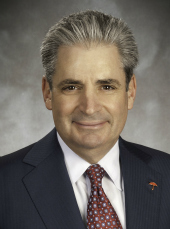Jay Fishman finds it more comfortable these days to use a wheelchair to get around, and has begun getting some help breathing from a portable ventilator.
The former Travelers CEO says he’s in “the final innings” of his battle with Lou Gehrig’s disease, the terminal neurodegenerative condition also called ALS, or amyotrophic lateral sclerosis. But Fishman says he has no plans to slow down.
He still goes to work almost daily in his role as board chairman – even though he stepped down in December – and is preparing for next month’s Travelers Championship PGA Tour golf tournament at TPC River Highlands in Cromwell, Conn. He and the company are using this year’s tournament as a megaphone to raise money and awareness about ALS.

“If I contemplated a retirement, it was going to be different from this, but it wasn’t going to be sitting on a beach,” he said in an interview with The Associated Press. “I always wanted to stay active and involved.”
Fishman has been doing that through philanthropy.
He’s helped fund a national project that is gathering information from hundreds of ALS patients to try and better understand the variations of the disease and how to fight it.
He’s raised money for a Boston Children’s Hospital project that “banks” the voices of ALS patients. When they lose the ability to speak, they can use computers that will speak for them in their own voices. He and his wife recently gave $3 million to fund a University of Pennsylvania project that helps patients with at-home respiratory care.
“You can be a skeptic and say, `Well, the only reason he’s doing it is that he has the disease,” Fishman said. “The answer is, `Yeah, of course.’ If not me than who? If I’m not going to reflect all the good things that have happened to me in my life and find a way to plow that back to help people deal with what I personally know is a horrible disease, then shame on me.”
Fishman is under no illusions that what he’s doing will save his life. What he is trying to do, he said, is move the needle toward a cure and make the lives of other ALS patients a little better. That’s where the golf tournament comes in.
At Fishman’s behest, the tournament, which donates 100 percent of its net proceeds to charity, has made New Britain’s Hospital for Special Care, which treats most of the ALS patients in Connecticut, as its primary charitable beneficiary this year.
“This is going to provide us with additional funding to help hire more people in the clinical operation and also to expand our clinical trials program,” said Dr. Kevin Felice, the hospital’s chief of neuromuscular medicine.
The tournament also is providing tickets to patients and their families. They will get valet parking and tournament officials are also building a large, wheelchair-friendly tent for them to watch the action and providing special dining options to accommodate those who have trouble swallowing – a common problem for ALS patients.
Players, caddies and tournament officials will wear red commemorative ribbons reading, “Carry On,” something Fishman is known to say when talking about the disease.
“Once Jay announced what he was battling, it made perfect sense for us to partner with them to fight this disease,” said Nathan Grube, the tournament’s director.
The Travelers has already raised an additional $1 million for the Bruce Edwards Foundation, an ALS charity, by selling tables to a dinner during the tournament featuring a talk by golfing legend Tom Watson. Edwards, who was from Wethersfield and Watson’s long-time caddie, died of the disease.
The Travelers Championship’s previous primary charity, Hole in the Wall Gang Camp for children with serious illnesses, will continue to be a charitable partner, and more than 140 charities will benefit from money raised, which last year totaled $1.5 million. Fourteen percent of the proceeds will go to the Hospital for Special Care.
Fishman, who was diagnosed in 2014, says the progression of the disease has forced him to work at home on Fridays, but he plans to stay on the job until he can no longer contribute.
“The pleasure I get now is from understanding that my efforts are at least helping other people,” he said. “I make sure I finish each day with a martini or a glass of wine and thank God for giving me another day.”
Was this article valuable?
Here are more articles you may enjoy.


 Lemonade Books Q4 Net Loss of $21.7M as Customer Count Grows
Lemonade Books Q4 Net Loss of $21.7M as Customer Count Grows  Insurance Broker Stocks Sink as AI App Sparks Disruption Fears
Insurance Broker Stocks Sink as AI App Sparks Disruption Fears  Florida Regulators Crack the Whip on Auto Warranty Firm, Fake Certificates of Insurance
Florida Regulators Crack the Whip on Auto Warranty Firm, Fake Certificates of Insurance  State Farm Adjuster’s Opinion Does Not Override Policy Exclusion in MS Sewage Backup
State Farm Adjuster’s Opinion Does Not Override Policy Exclusion in MS Sewage Backup 

